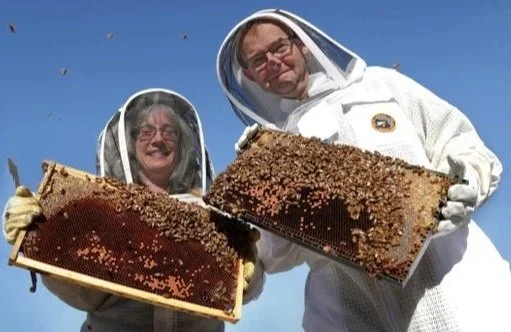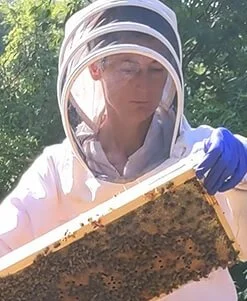LACBA Speaker February 2, 2026 - Los Angeles County - Agricultural Commissioner Speaker
California Apiary Registration for 2026
In Los Angeles County, all beekeepers are required to:
• Register their hives annually with the County Agricultural Commissioner / Weights & Measures office by completing the Annual Apiary Registration form. (FAC § 29044)
Speakers from the Agricultural Commissioner / Weights and Measures will be attending in-person to provide information and updates needed to complete your hive registration before the deadline on January 31, 2026. Join us for help finding your city beekeeping ordinances, registering your bee removal services, and navigating the process of apiary registration!
Los Angeles County - Agricultural Commissioner / Weights & Measures
LACBA Speaker November 3, 2025 -
Boris & Barbara Baer
What’s the Buzz at CIBER
Boris and Barbara will give you an update on selected research projects at the Center for Integrative Bee Research (CIBER). Current topics (among others) include developing sensors to predict hive health, Varroa mite tolerant bee genotypes, a “grumpometer” and finding a Rosetta stone to translate bee language.
CIBER is located at UC Riverside. CIBER researchers collaborate with beekeepers from local clubs. Many projects involve scientists from different disciplines and universities within and outside the US.
Boris Baer is Professor for Pollinator Health and director of CIBER.
Barbara Baer-Imhoof is Associate Specialist for Pollinator Health and co-director of CIBER
Bios
Both studied biology at the University of Zurich, Switzerland. Boris finished with a master’s on tamarin monkeys in the rainforest of French Guyana, while Barbara studied the behavior of wall lizards in Zurich.
The two met while researching bumblebees during their PhD at the Swiss Federal Institute of Technology in Zurich.
Boris continued his scientific career with a post-doc at the University of Copenhagen on leafcutter ants. Barbara stayed in Zurich and evaluated human resources data for a Swiss Bank. She concluded that period of her life with an MBA and by moving to Copenhagen.
The couple has two sons Andrin (23) and Lucien (18)
In their free time they enjoy discovering new landscapes together. Boris loves building model ships and collecting model trains, while Barbara is an avid (audiobook) reader and loves dancing.
LACBA Speaker October 6, 2025 -
Anne Frey
Oops the mistakes I've made...
Anne lives in Greenwich, NY, and works as Betterbee's Head Beekeeper, teacher, and videographer (catch her on Betterbee's YouTube channel!). She first got bees in 1989 while getting a Biology degree, and like most of us, she was a "bee-haver" for just a few years, until she became a member of the local beekeeping club (the Southern Adirondack Beekeepers Association, or SABA), where she learned a lot from the other members and through club activities.
Anne worked her way up through the Club, becoming invaluable to its operation and leading the Annual Seminar and Bee School for many years. Beekeeping associations are so valuable to us because of the arranged speakers and events, but also because of the networking, support, and mentoring that comes about when people find a group near them. Anne became an EAS Master Beekeeper in 2002 and is still learning to this day. In her limited spare time, she reads sci-fi and rides her bike long distances.
Visit her website at: https://www.betterbee.com/
LACBA Speaker September 8, 2025 - Randy Oliver
Presentation of on-going research projects
Randy Oliver is a world renowned speaker, educator, bee biologist, leading researcher, commercial beekeeper, and regular contributor to the American Beekeeping Journal. He is one of the premier beekeeping speakers in the U.S. and the owner/author of http://scientificbeekeeping.com
LACBA Speaker August 4, 2025 - Emilia Burnham
American Honey Princess Experience
Emilia Burnham is the 2025 American Honey Princess and a graduating Master's student from the Center of Integrative Bee Research (CIBER) at UC Riverside under Dr. Boris Baer. She will give a snapshot of her princess-ing adventures across the country, representing the honey and beekeeping industry, and provide tips for your promotions! She will also share the highlights of her research on comparing the immune responses of commercial and wild honeybee genotypes to Nosema ceranae.
American Honey Princess Emilia Burnham is the daughter of John and Pavlina Burnham of Murrieta, California. She is a graduating master’s student at the University of California, Riverside, where she is majoring in entomology. Her studies focus on the honeybee microscopic fungal parasite Nosema ceranae. Emilia is a fourth-generation beekeeper with a strong interest in honeybee products and their benefits to mankind. She will continue her studies in August 2026 at Western University of Health Sciences in Pomona for her PhD in Biotechnology and Pharmaceutical Sciences, studying honeybee venom and arthritis. In her free time, she enjoys crocheting, ballroom dancing, baking, and spending time with loved ones.
Links & social media:
https://abfnet.org/american-honey-queen-program/ https://www.facebook.com/AmericanHoneyQueenProgram/ https://www.instagram.com/americanhoneyqueenprogram/
https://www.instagram.com/mimibee822/
https://www.facebook.com/emilia.burnham822/
LACBA Speaker July 7, 2025 - Theresa Martin
Better Beekeeping with BroodMinder Temperature Sensors
Would it be helpful to know if your colony is queenright before opening the hive? Or that your colony swarmed? Would it be helpful to know if a Varroa mite treatment killed the queen? A simple, inexpensive temperature sensor inside the hive that pairs with a smart phone can do this and more. “Precision beekeeping” uses technology that improves decision making and revolutionizes beekeeping decisions to enable healthier, more productive colonies. In this presentation, Theresa Martin shares 5 real life examples and the improved outcomes enabled by temperature sensors.
BIOGRAPHY
Theresa Martin is the author of Dead Bees Don’t Make Honey: 10 Tips for Healthy Productive Bees, which includes a Foreword by Dr. Thomas Seeley. Theresa has achieved 99% colony survival and honey production that is twice the local average in her seven years as a beekeeper, with 20–25 colonies in Kentucky. She practices a beekeeping methodology that places bee health as the highest priority and optimal pathway to productivity. Following the model of how bees survive in the wild, employing integrated pest management, and providing high support yet low intervention, she demonstrates that healthy, alive bees are more productive than sick or dead bees. Theresa is a Cornell Master Beekeeper, 2024 Kentucky State Beekeeper of the Year, and Vice-President of the Kentucky State Beekeepers Association. She worked at Fidelity Investments and Procter & Gamble in information technology and operations management. Theresa can be reached at theresa@littlewolf.farm
My new book is now available!
https://www.amazon.com/Dead-Bees-Dont-Make-Honey/dp/B0CY9G9C89
My Facebook page is:
https://www.facebook.com/groups/deadbeesdontmakehoney
My YouTube channel is:
https://www.youtube.com/@deadbeesdontmakehoney
LACBA Speaker June 2, 2025 - Stephanie Slater
All About Honey Shows
Stephanie Slater is the owner of Jam Session Honey and Preserves and has been keeping honey bees in Walworth County (Wisconsin) for nine years. She serves on the boards of the Walworth County Beekeepers Association and the Wisconsin Honey Producers Association and just completed a term on board of the American Beekeeping Federation. She is the 2022 Wisconsin Beekeeper of the Year, the 2023 American Honey Show Best of Show winner, and an American Honey Show Training Council Certified Honey Judge.
Do you want to know more about honey shows? Are you interested in learning how you can prepare your hive products for competition? This workshop will be a discussion on preparing honey and beeswax entries for the Orange County Fair 2025 honey competition. Come prepared with all of your honey show questions.
You can find Jam Session Honey and Preserves on Facebook at https://www.facebook.com/jamsessionhoney or http://www.awardwinninghoney.com. You can check out the Beekeeping Today Podcast #328 where Stephanie talks about judging honey shows: https://www.beekeepingtodaypodcast.com/judging-honey-shows-with-stephanie-slater-328/
LACBA Speaker May 5, 2025 - Carmen Black
Tropilaelaps Mites: Unraveling the Growing Threat and Expanding Knowledge Gaps
Hello! My name is Carmen Black. I am a PhD student in the Samuel Ramsey Lab at CU Boulder (The Boulder Bee Lab). I have a bachelors in Environmental Science with a minor in biology and masters in Entomology and Plant Pathology from the University of Tennessee. In my masters I worked on arthropod diversity studies, arthropod and bat interactions, and tick-borne pathogens. My main interests include parasite ecology, vector biology, and conservation biology. I currently work on Tropilaelaps mite life cycle, life history strategies, and pathogen detection in the Tropilaelaps virome. Please feel free to reach out to me at carmen.black@colorado.edu
LACBA Speaker April 7, 2025 - Mark Allen (In person)
Understanding Disease Management and Vaccinated Honey Bee Queens within the Colony
Mark Allen is the Western Account Manager for Dalan Animal Health, providing the first honey bee queen vaccine for prevention and suppression of disease within the honey bee colony.
He is also a commercial beekeeper in Northern California, supplying high quality queen bees and pollination services for over 20 years. Beehonestfarms.com
Mark earned his Bachelor’s of Science degree in Horticulture from California State Polytechnic University, Pomona, and has enjoyed a career working with farms and orchards across the Western United States.
Of special interest, Mark is also a past member of LACBA and past President of the Beekeepers Association of Southern California from 2005-2009.
LACBA Speaker March 3, 2025 - Kyle Atkinson
Inside the Hive: A Trial on Optimizing Bee Entrance Control for a Better Hive Microclimate
Kyle is the Director of BeeIQ Solutions and the creator of HiveGate (a redesigned hive entrance). Growing up in a family focused on animal training and breeding, he developed a deep understanding of animal behavior. He built a successful 30-year career as a farrier and blacksmith while also working as a professional animal wrangler, horse trainer, and stunt double in film and television. His expertise contributed to major productions like The Last Samurai and The Chronicles of Narnia, where he trained animals for on-screen performances.
In 2014, a serious back injury ended Kyle’s career, prompting him to turn his beekeeping hobby into a profession. He began studying how modern commercial hives affect bee health, recognizing issues like robbing, condensation, temperature stress, and disease. Drawing inspiration from bees’ natural habitat in tree cavities, he questioned whether hive design could be improved to better support colony health while remaining commercially viable. This led to the development of HiveGate and ongoing research into optimizing hive structures.
Passionate about education and giving back, Kyle has volunteered in India and Fiji, teaching families about animal welfare and supporting those who rely on working horses. In New Zealand, he established beekeeping programs in primary schools and served as president of the Rodney Beekeeping Association before stepping down to focus on BeeIQ. His work remains dedicated to improving beekeeping practices for both bees and beekeepers.
https://www.beeiqsolutions.com/
To save honey bees, we need to design them new hives
Honeybee cluster—not insulation but stressful heat sink
Honeybees cluster together when it’s cold – but we’ve been completely wrong about why
LACBA Speaker February 3, 2025 - Patrick Hardy
Bee Recovered: Proven Disaster Recovery in Just 14 Days
Patrick, is the founder and CEO of the largest small business disaster management company in the US, author of a revolutionary book on disasters, an internationally-award winning keynote speaker, and a 20-year decorated disaster professional. In 2024 he decided to take on a challenge to develop the world’s first honeybee emergency response team!
https://www.beeplatoon.com/
LACBA Speaker January 6, 2025 - MARY JO (MJ) REUTTER (In person lecture, join us)
Beeswax + Pigment: The Beauty and Fun of Encaustic Painting
MARY JO (MJ) REUTTER
MJ is a professional toy and game inventor who channels her creativity into encaustic painting during her spare time. She has been exploring the art of encaustics for nearly a decade, showcasing her work in various exhibits and serving as a board member of the International Encaustic Artists organization for the past five years.
This past year, MJ took the Bee Keeping 101 class, deepening her appreciation for bees and the extraordinary wax they produce. She’s thrilled to share her passion for this ancient and captivating art form, demonstrating how the same beeswax your hives create can become a medium for vibrant, enduring works of art.


















